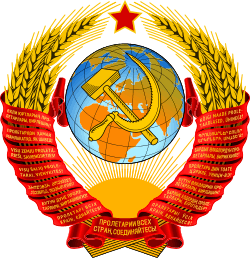Presidium of the Supreme Soviet
 |
| This article is part of a series on the politics and government of the Soviet Union |
|
Judiciary |
The Presidium of the Supreme Soviet (Russian: Президиум Верховного Совета or Prezidium Verkhovnogo Soveta) was a Soviet governmental institution – a permanent body of the Supreme Soviets (parliaments). This body was of the all-Union level (Presidium of the Supreme Soviet of the Soviet Union), as well as in all Soviet republics (e.g., Presidium of the Supreme Soviet of the Byelorussian SSR) and autonomous republics. Structure and functions of the presidiums in these republics were virtually identical.[1] The presidiums were elected by the Supreme Soviet to act on its behalf while the soviet was not in session. Under the 1936 and 1977 Soviet Constitution the Presidium of the Supreme Soviet served as the collective head of state of the Soviet Union.[2]
Structure
Its building, situated inside the Moscow Kremlin, was appropriately named the Kremlin Presidium.
The Presidium of the Supreme Soviet was elected by the Supreme Soviet of the USSR at a joint session of both chambers at the first session of each following convocation. The deputies of the Presidium were appointed for the duration of the term of office of the Supreme Soviet. The Presidium of the Supreme Soviet of the USSR consisted of a chairman, his 15 deputies (one from each republic of the Soviet Union), a secretary, and 20 members. The Presidium was accountable to the Supreme Soviet of the USSR for all its activities.
Constitutional powers
According to the 1936 Constitution of the USSR, the basic powers of Presidium of the Supreme Soviet of the USSR were:
- promulgation of decrees;
- interpretation of current Soviet laws;
- dissolution of the Supreme Soviet of the USSR on the basis of Article 47 of the Constitution of the USSR and setting new elections: carrying out a national referendum on its own initiative or at the request of one of the republics of the Union;
- abrogation of decrees, issued by the Council of Ministers and Council of Ministers of the republics of the Union in case there is a discrepancy with the law;
- relieving the Chairman of the Council of Ministers of his post and appointing Ministers of the USSR (between sessions of the Supreme Soviet) with the subsequent submittal for the Supreme Soviet’s approval;
- establishment of orders and medals of the USSR and carrying out the awarding procedures;
- establishment of honorary titles of the USSR and their assignment;
- realization of the right to pardon;
- appointment and dismissal of the highest command of the Soviet Armed Forces;
- establishment of military and diplomatic ranks and other special ranks;
- declaration of the general and partial mobilization;
- declaration of war in case of an attack on the USSR or in case when it was necessary to implement obligations of international mutual defense treaties;
- ratification and denunciation of international treaties, signed by the USSR;
- representation of the Supreme Soviet of the USSR (between its sessions) in its relations with parliaments of foreign countries;
- appointment and dismissal of Soviet plenipotentiaries in foreign countries;
- receiving of Letters of Credence and Letters of Recall from foreign diplomatic representatives, accredited in the USSR;
- declaration of the martial law in a given region or across the USSR in the interest of defending the USSR or preserving public order and state security.
The presidium also dealt with questions regarding the acquisition of the Soviet citizenship, its forfeiting or voluntary rejection.
See also
- List of heads of state of the Soviet Union
- First Deputy Chairman of the Presidium of the Supreme Soviet of the USSR
- Presidium of the Supreme Soviet of the Russian SFSR
References
- ↑ Where nation-states come from: institutional change in the age of nationalism by Philip G. Roeder, p. 70
- ↑ Ideology, Politics, and Government in the Soviet Union: An Introduction– Google Knihy. Books.google.cz. January 1, 1978. Retrieved 2016-11-26.
Coordinates: 55°45′08″N 37°37′12″E / 55.7523°N 37.6200°E